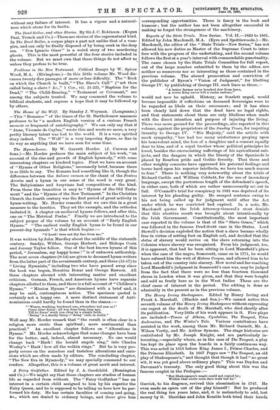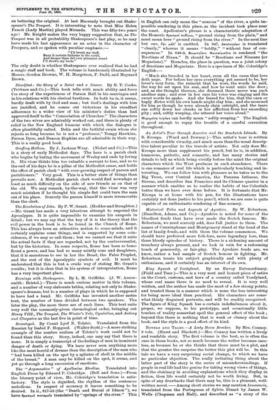its publication. Very little of his work appears in it.
Five plays are included—Timon of Athens, Cymbeline, The Tempest, Titus
Andronicus, and The Winter's Tale. Various contributors have assisted in the work, among them Mr. Richard Garnett, Mr. A. Wilson Verity, and Mr. Arthur Symons. The stage histories are contributed by Mr. Joseph Knight, and are particularly in- teresting,—especially where, as in the case of The Tempest, a play has kept its place upon the boards in a fairly continuous way.
This was acted in 1613 before King James I., Prince Charles, and the Princess Elizabeth. In 1667 Pepys saw " The Tempest, an old play of Shakespeare's," and thought that though it had " no great wit, it was yet good above ordinary plays." This was Dryden and Davenant's travesty. The only good thing about this was the famous couplet in the Prologue :—
"But Shakespeare's magic could not copied be; Within that circle none dare walk but he."
Garrick, to his disgrace, revived this abomination in 1747. He even made an opera out of the play himself ! But he produced the real thing ten years later, and, it is melancholy to add, lost money by it. Sheridan and John Kemble both tried their hands
on bettering the original. At last Macready brought out Shake- speare's The Tempest. It is interesting to note that Miss Helen Faucit (Lady Martin) played Miranda. This was fifty-two yeari ago ! Mr. Knight makes the very happy suggestion that, as The Tempest was in all probability Shakespeare's last play, so he may have made his last appearance as an actor in the character of Prospero, and so spoken with peculiar emphasis:— "I'll break my staff. Bury it certain fathoms in the earth. And deeper than did ever plummet sound I'll drown my book."
The only doubt is whether Shakespeare ever realised that he had a magic staff and book. The volume is handsomely illustrated by Messrs. Gordon Browne, W. H. Margetson, F. Dadd, and Maynard Brown.



















































 Previous page
Previous page